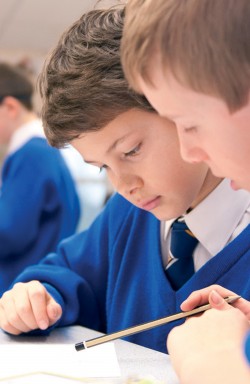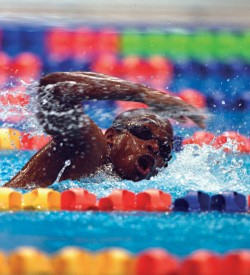Today you will…
...Reflect on the Olympic values by using reading and thinking skills to learn about an inspirational Olympic ‘hero’.
Are you looking to do something with your Year 10 and 11 classes that’s a little bit different, but will still be relevant to GCSE preparation as well as current affairs? If so, giving an Olympic twist to the way you approach some of the broader context areas, particularly those relating to personal characteristics, sport and global issues could be just the thing. Finding out about athletes such as Eric ‘the Eel’ Moussambani, and the way in which they exemplify the Olympic values can not only involve pupils in developing their reading skills though engagement with authentic resources but can also provide the starting point for thinking about wider issues, and even lead to a centre devised Olympic themed controlled writing or speaking assessment task.
Starter activity
Begin with an ‘odd one out’ game. Show the students the outlines of Africa, Europe, Australia and Asia and challenge them to say which the odd one out is and why. Depending on the ability of the class they will come up with various ideas (such as Europe, because it doesn’t start with an ‘a’ etc), but keep them thinking (“anything else…?”) and encourage them to discuss this in pairs. Once they’ve exhausted all their ideas reveal a map (/tiny.cc/o7k34) of the world showing which continents have hosted the Olympics and then ask the same question, pointing out that South America will host the games in Rio in 2016.
Main activities

1. Adding values
Explain that in this lesson students are going to think about some of the Olympic values and what it takes to be a sporting hero. Show a slide with a selection of abstract nouns in the target language, and ask learners if they know which ones are the Olympic values (Excellence, Respect and Friendship).
To familiarise the students with these values, get them to do a card sorting exercise in the target language: they read a series of short statements and decide which value it is an example of (e.g. Fair play is an example of this value (respect); It’s about achieving your goals (excellence); It’s about overcoming differences (friendship) etc).
2. Hunting for heroes
The next activity is to consider what a sporting hero is. Give students a short period of time to brainstorm some ideas with the aid of a dictionary. This could be done in groups or as a think/pair/share activity. Learners could then categorise the words they have come up with into adjectives, verbs etc. Lower ability pupils could be given a sheet with a list of characteristics to rank (e.g. successful, wins a medal, good looking, earns a lot of money, famous, respects others, brave…) They should then try to come up with a definition of a hero; can they think of any sporting heroes that fit that bill?
Introducing eric the eel…
Tell students they are going to learn about one of the sporting heroes of the Sydney 2000 games. Show images of different Olympic sports (include swimming!) and get them to guess which sport the person represents. This will be an opportunity to revise some sports related vocabulary and you could choose words that that particular class gets wrong in exam papers in order to revise them! A very able class could be challenged to ask questions about the sport itself in order to identify it.
Once they have established that the sport is swimming, show them pictures of a lake, a river, the sea and a swimming pool with the caption in the target language “Where is the best place to train for competitive swimming?” and get them to give reasons why they would or would not choose certain places. Less able students could be given a bank of words to help them come up their reasons such as: cold, currents, dangerous, rough, strong, calm, fish, waves, crocodiles….
Then show an image of ‘Eric the Eel’ and get pupils to come up with some questions about him to which they would like to find the answers. They could be given prompts like who? what? where? why? when? in the target language. The pupils then read a short text with the key information about Eric to see if they can find the answers. The main facts about Eric are available on the Wikipedia page about him in the target language, from which a summary of approximately 150 words should be produced to give to students, with the odd word glossed, if necessary. On the left hand side of the English Wikipedia page (en.wikipedia.org/wiki/Eric_Mous sambani ) there are links to the versions in other languages.
Depending on the ability of the class, the text can be presented in different ways; more able pupils can read it in full and try using strategies such as spotting clues in the context and looking for cognates before turning to a dictionary, whilst less able pupils might benefit from having the text broken down either into chunks or individual sentences, or being further simplified. To check understanding of the text the pupils could be asked questions in a similar format to the ones that they will encounter in their GCSE exam, which, depending on the examination board, could be multiple choice, answers in English, completing a summary with key words etc.

Home learning
The following written activities work as preparation for controlled assessment tasks:
• Imagine you have interviewed Eric (or any other sporting figure); write a report of this
• You are a Young Games Maker at the Olympics – give an account of your experience
• Write about ‘A day at the Games’
• Write about ‘My Sporting Hero’
Summary
Show a short video of Eric’s performance at the Sydney Olympics.
As a class, encourage pupils to revisit their definition of what a hero is and reflect upon which Olympic values Eric embodies.
Info Bar
Additional resources
Vocab express (vocabexpress.com) is an online vocabulary learning application for schools. Teacher workload is minimised through pre-loaded vocabulary from major exam boards and leading text book publishers. Regular on-line tests can be easily set up with no preparation or marking overhead. All activity may be monitored by the teacher through a comprehensive set of real-time progress tracking tools.
Stretch them further
Eric’s story also embodies some of the paralympic values (courage, determination, inspiration and equality). The stories of some paralympic athletes, such as the canadian rick hansen and the german verena bentele, could be used to consider these.
On the theme of equality, your pupils could explore the difficulties that athletes in some parts of the world face in order to train for major sporting events. Some swimmers in the congo, for example are still having to train in rivers (tiny.cc/q1nwk), the mascot of the congolese swimming federation being a crocodile!
About the expert
Liz Fotheringham is an experienced MFL teacher, former regional subject adviser for the secondary curriculum and trainer with the Network for languages. She has also written resources for OUP and Teachit languages.










